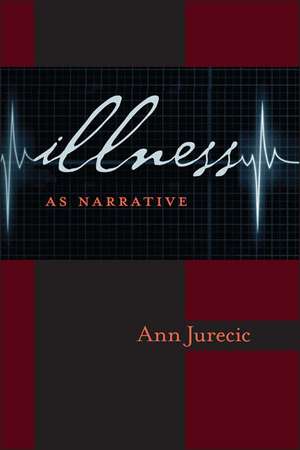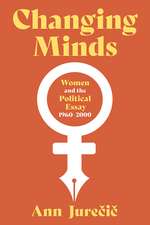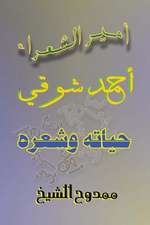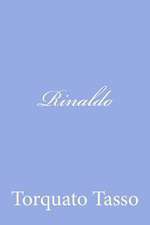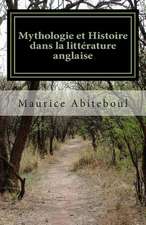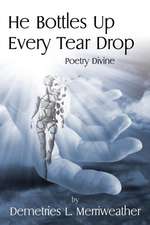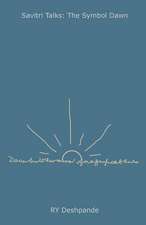Illness as Narrative: Composition, Literacy, and Culture
Autor Ann Jurecicen Limba Engleză Paperback – 2 mar 2012
For most of literary history, personal confessions about illness were considered too intimate to share publicly. By the mid-twentieth century, however, a series of events set the stage for the emergence of the illness narrative. The increase of chronic disease, the transformation of medicine into big business, the women’s health movement, the AIDS/HIV pandemic, the advent of inexpensive paperbacks, and the rise of self-publishing all contributed to the proliferation of narratives about encounters with medicine and mortality.
While the illness narrative is now a staple of the publishing industry, the genre itself has posed a problem for literary studies. What is the role of criticism in relation to personal accounts of suffering? Can these narratives be judged on aesthetic grounds? Are they a collective expression of the lost intimacy of the patient-doctor relationship? Is their function thus instrumental—to elicit the reader’s empathy?
To answer these questions, Ann Jurecic turns to major works on pain and suffering by Susan Sontag, Elaine Scarry, and Eve Sedgwick and reads these alongside illness narratives by Jean-Dominique Bauby, Reynolds Price, and Anne Fadiman, among others. In the process, she defines the subgenres of risk and pain narratives and explores a range of critical responses guided, alternately, by narrative empathy, the hermeneutics of suspicion, and the practice of reparative reading.
Illness as Narrative seeks to draw wider attention to this form of life writing and to argue for new approaches to both literary criticism and teaching narrative. Jurecic calls for a practice that’s both compassionate and critical. She asks that we consider why writers compose stories of illness, how readers receive them, and how both use these narratives to make meaning of human fragility and mortality.
While the illness narrative is now a staple of the publishing industry, the genre itself has posed a problem for literary studies. What is the role of criticism in relation to personal accounts of suffering? Can these narratives be judged on aesthetic grounds? Are they a collective expression of the lost intimacy of the patient-doctor relationship? Is their function thus instrumental—to elicit the reader’s empathy?
To answer these questions, Ann Jurecic turns to major works on pain and suffering by Susan Sontag, Elaine Scarry, and Eve Sedgwick and reads these alongside illness narratives by Jean-Dominique Bauby, Reynolds Price, and Anne Fadiman, among others. In the process, she defines the subgenres of risk and pain narratives and explores a range of critical responses guided, alternately, by narrative empathy, the hermeneutics of suspicion, and the practice of reparative reading.
Illness as Narrative seeks to draw wider attention to this form of life writing and to argue for new approaches to both literary criticism and teaching narrative. Jurecic calls for a practice that’s both compassionate and critical. She asks that we consider why writers compose stories of illness, how readers receive them, and how both use these narratives to make meaning of human fragility and mortality.
Din seria Composition, Literacy, and Culture
-
 Preț: 426.79 lei
Preț: 426.79 lei -
 Preț: 430.66 lei
Preț: 430.66 lei -
 Preț: 426.79 lei
Preț: 426.79 lei -
 Preț: 390.71 lei
Preț: 390.71 lei -
 Preț: 388.79 lei
Preț: 388.79 lei -
 Preț: 139.01 lei
Preț: 139.01 lei -
 Preț: 425.86 lei
Preț: 425.86 lei -
 Preț: 388.79 lei
Preț: 388.79 lei -
 Preț: 388.79 lei
Preț: 388.79 lei -
 Preț: 348.83 lei
Preț: 348.83 lei -
 Preț: 210.43 lei
Preț: 210.43 lei -
 Preț: 199.10 lei
Preț: 199.10 lei -
 Preț: 181.71 lei
Preț: 181.71 lei -
 Preț: 422.97 lei
Preț: 422.97 lei -
 Preț: 388.79 lei
Preț: 388.79 lei -
 Preț: 318.60 lei
Preț: 318.60 lei -
 Preț: 386.88 lei
Preț: 386.88 lei -
 Preț: 362.33 lei
Preț: 362.33 lei -
 Preț: 446.05 lei
Preț: 446.05 lei -
 Preț: 390.71 lei
Preț: 390.71 lei -
 Preț: 391.67 lei
Preț: 391.67 lei -
 Preț: 383.01 lei
Preț: 383.01 lei -
 Preț: 358.46 lei
Preț: 358.46 lei -
 Preț: 197.45 lei
Preț: 197.45 lei -
 Preț: 388.79 lei
Preț: 388.79 lei -
 Preț: 359.07 lei
Preț: 359.07 lei -
 Preț: 349.99 lei
Preț: 349.99 lei -
 Preț: 356.55 lei
Preț: 356.55 lei -
 Preț: 387.82 lei
Preț: 387.82 lei -
 Preț: 360.37 lei
Preț: 360.37 lei -
 Preț: 392.66 lei
Preț: 392.66 lei -
 Preț: 425.86 lei
Preț: 425.86 lei -
 Preț: 424.88 lei
Preț: 424.88 lei -
 Preț: 391.67 lei
Preț: 391.67 lei -
 Preț: 386.88 lei
Preț: 386.88 lei -
 Preț: 348.83 lei
Preț: 348.83 lei -
 Preț: 386.88 lei
Preț: 386.88 lei -
 Preț: 389.38 lei
Preț: 389.38 lei -
 Preț: 385.91 lei
Preț: 385.91 lei -
 Preț: 384.92 lei
Preț: 384.92 lei -
 Preț: 385.91 lei
Preț: 385.91 lei -
 Preț: 384.00 lei
Preț: 384.00 lei -
 Preț: 426.79 lei
Preț: 426.79 lei -
 Preț: 426.79 lei
Preț: 426.79 lei -
 Preț: 350.79 lei
Preț: 350.79 lei -
 Preț: 386.88 lei
Preț: 386.88 lei -
 Preț: 350.79 lei
Preț: 350.79 lei -
 Preț: 383.01 lei
Preț: 383.01 lei -
 Preț: 350.79 lei
Preț: 350.79 lei -
 Preț: 385.91 lei
Preț: 385.91 lei
Preț: 349.99 lei
Nou
Puncte Express: 525
Preț estimativ în valută:
66.99€ • 72.79$ • 56.31£
66.99€ • 72.79$ • 56.31£
Carte tipărită la comandă
Livrare economică 22 aprilie-06 mai
Preluare comenzi: 021 569.72.76
Specificații
ISBN-13: 9780822961901
ISBN-10: 0822961903
Pagini: 192
Dimensiuni: 152 x 229 x 15 mm
Greutate: 0.3 kg
Ediția:1
Editura: University of Pittsburgh Press
Colecția University of Pittsburgh Press
Seria Composition, Literacy, and Culture
ISBN-10: 0822961903
Pagini: 192
Dimensiuni: 152 x 229 x 15 mm
Greutate: 0.3 kg
Ediția:1
Editura: University of Pittsburgh Press
Colecția University of Pittsburgh Press
Seria Composition, Literacy, and Culture
Recenzii
“Ann Jurecic opens a door. The light that spills through that newly opened door illuminates not just illness and/as narrative but why we read, why we write, and what stories are for. Jurecic nails what is at stake here—truth, intersubjectivity, relation, mortality, and freedom. What a voice. What a vision. What a challenge this book is to literary criticism, to medical practice, to all of us who bleed and yet live.”
—Rita Charon, Columbia University
—Rita Charon, Columbia University
“There is no greater term of scholarly disparagement than ‘therapeutic.’ Jurecic’s eloquent defense of therapeutic literature is as necessary and humane as the misunderstood illness narrative itself. Promoting mindful listening and sympathetic understanding, this gutsy and levelheaded book performs its own reparative work, restoring care and concern, recognition and response, attention and acknowledgement, healing and hope to our critical lexicon.”
—Diana Fuss, Princeton University
—Diana Fuss, Princeton University
“lllness as Narrative is an innovative work that provides an exemplary model of productive ways to read, interpret, and (by extension) teach literature (autobiography, essays, cultural analyses, fiction, poetry, and blogs) by and about real people with real diseases and disabilities.”
—Lynn Z. Bloom, University of Connecticut
—Lynn Z. Bloom, University of Connecticut
“Ann Jurecic’s readings of Sontag, Fadiman, Sedgwick, and Latour carve new pathways between literary theory and illness narratives. Illness as Narrative will refresh your vision, draw you to new texts, and help you teach.”
—Maura Spiegel, coauthor of The Grim Reader: Writings on Death, Dying, and Living On
—Maura Spiegel, coauthor of The Grim Reader: Writings on Death, Dying, and Living On
“Offers substantive confirmation of the continuing scholarly trends in support of the genre of narrative medicine and for the primary value of the patient’s voice in the practice of medicine. . . . Jurecic is a mindful reader and she successfully provides a succinctly written arc of the emergence of illness narratives in the twentieth century. . . . A must read for all Literature and Medicine courses and certainly will be added to Medical Humanities programs around the country.”
—All Heart Matters
—All Heart Matters
Notă biografică
Ann Jurecic is assistant professor of English at Rutgers University.
Descriere
While the illness narrative is now a staple of the publishing industry, the genre itself has posed a problem for literary studies. What is the role of criticism in relation to personal accounts of suffering? Can these narratives be judged on aesthetic grounds? Are they a collective expression of the lost intimacy of the patient-doctor relationship? Is their function thus instrumental—to elicit the reader’s empathy?
To answer these questions, Ann Jurecic turns to major works on pain and suffering by Susan Sontag, Elaine Scarry, and Eve Sedgwick and reads these alongside illness narratives by Jean-Dominique Bauby, Reynolds Price, and Anne Fadiman, among others. In the process, she defines the subgenres of risk and pain narratives and explores a range of critical responses guided, alternately, by narrative empathy, the hermeneutics of suspicion, and the practice of reparative reading.
To answer these questions, Ann Jurecic turns to major works on pain and suffering by Susan Sontag, Elaine Scarry, and Eve Sedgwick and reads these alongside illness narratives by Jean-Dominique Bauby, Reynolds Price, and Anne Fadiman, among others. In the process, she defines the subgenres of risk and pain narratives and explores a range of critical responses guided, alternately, by narrative empathy, the hermeneutics of suspicion, and the practice of reparative reading.
